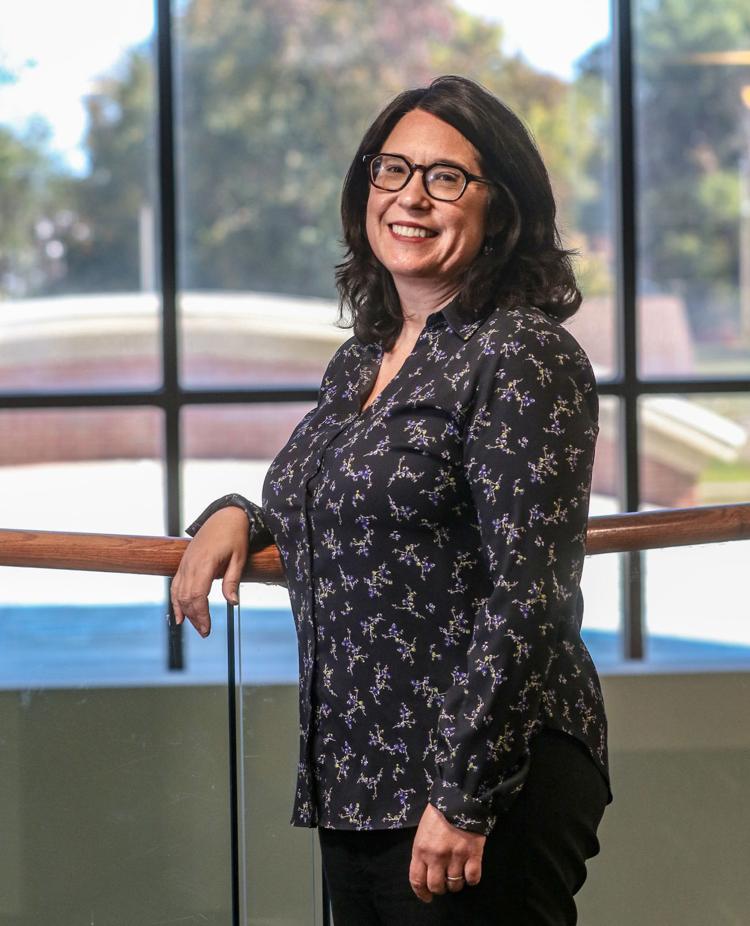Published on October 22, 2020
Owensboro Health now offers genetic counseling
By Renee Beasley Jones, Messenger-Inquirer

When Jodie Huff tells people what she does for a living, she gets a lot of puzzled looks.
Huff often finds herself explaining she does.
Huff is a genetic counselor who specializes in oncology, or the study of cancer.
Physicians refer patients to Huff when there is a concern a patient may have inherited a mutation in a gene that puts him or her at high risk of developing cancer.
Huff recently became Owensboro Health’s first genetic counselor. She works at Mitchell Memorial Cancer Center.
“There isn’t much in the way of genetic counseling in western Kentucky,” Huff said.
For a while, she worked at Norton Cancer Institute in Louisville.
Then, she offered genetic counseling for a national telegenetics company. Doctors nationwide would refer patients, who met with Huff online.
Through the grapevine, Huff learned OH was looking for a genetic counselor. She prefers visiting with patients face-to-face in a clinical setting more than online, so the job appealed to her.
Huff started in late September.
Genetic counseling is part of the precision medicine movement, which takes into account a patient’s gene pool, environment and lifestyle choices.
Genetic counseling is in all types of medicine, Huff said. Three common specialties are prenatal, pediatric and oncology.
Many people are familiar with BRCA gene mutations, commonly referred to as breast cancer genes. Oscar-winning actress Angelina Jolie thrust BRCA genes into the spotlight in 2013 when genetic tests showed she was at higher risk of breast cancer.
After hearing the news, Jolie had surgeons perform a preventative double mastectomy.
By identifying genetic abnormalities, Huff said doctors can focus on prevention and wellness.
There are downsides to public testing or “recreational genetics,” she said. For example, Ancestry.com and 23andMe are widely popular but they don’t provide the information needed to discover medical issues in families.
“In addition to gene information, (genetic counselors) can assess the risk of developing cancer,” Huff said.
While genetics play an important role, environment and lifestyles also can contribute to developing cancer, she said.
“ ...Precision medicine is becoming increasingly important in treating cancer,” Huff said.
In the future, she said, many more therapies will be geared toward a person’s genetics as well as their pathology.
Information from genetic counselors benefit patients, but it also can prove important for siblings and children.
When it comes to cancer, a family history or the early onset of the disease are good reasons for a patient to talk to his doctor about a referral to a genetic counselor, Huff said.
Renee Beasley Jones, 270-228-2835, rbeasleyjones@messenger-inquirer.com
About Owensboro Health
Owensboro Health is a nonprofit health system with a mission to heal the sick and to improve the health of the communities it serves in Kentucky and Indiana. The system includes Owensboro Health Regional Hospital, nationally recognized for design, architecture and engineering; Owensboro Health Muhlenberg Community Hospital; Owensboro Health Twin Lakes Medical Center; the Owensboro Health Medical Group comprised of over 350 providers at more than 30 locations; four outpatient Healthplex facilities, a certified medical fitness facility, the Healthpark; a weight management program, and the Mitchell Memorial Cancer Center.
On average each year, we have more than 19,000 inpatient admissions, deliver 2,000 babies and provide the region’s only Level III NICU. Owensboro Health physicians perform nearly 33,000 surgical procedures, including nearly 150 open-heart surgeries. Our physicians and staff have 90,000 Emergency Department visits and more than 1.25 million outpatient visits annually. Visit our home page for more information.